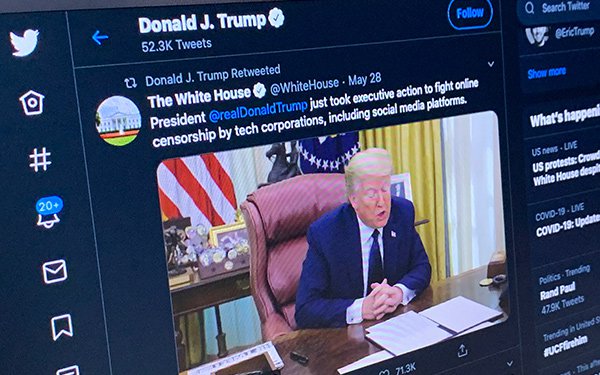
President Trump's recent order regarding social
media violates the First Amendment, but reacting to that order now would be premature, according to the Association of National Advertisers' general counsel Doug Wood.
In a statement issued Wednesday, Wood criticized Trump for “using his bully
pulpit to issue threats” aimed at dictating how web companies treat content on their platforms.
At the same time, he is recommending that advertisers take a wait-and-see approach to the
order.
“We are advising restraint for the time being,” he says in an email to MediaPost. “It’s best to let this play out and monitor what will impact
brands.”
Wood's comments come almost one week after Trump signed an executive
order directing regulators to consider crafting rules that could tie web companies' protection from lawsuits to content moderation policies. That order directs the Commerce Department to petition
the Federal Communications Commission for regulations that could deprive online platforms of their immunity rom civil suits based on material posted by users.
Trump issued the directive after Twitter alerted users to dubious claims in two of his
tweets.
The order also contains sweeping language accusing Twitter and other platforms of “censorship,” because they sometimes remove or restrict users' content.
But
Wood says Trump is the one violating the First Amendment, by attempting to compel private companies to carry speech.
“The First Amendment protects us from having the government suppress
or compel our speech except in very limited circumstances,” Wood states. “If speech is political in nature, it's perfectly fine to lie. That's what politicians often do. But that does not
mean publishers or media companies have to perpetuate lies if they deem that unacceptable.”
On Tuesday, the digital rights group Center for Democracy & Technology sued to block the order. The organization says the order violates the First
Amendment because it “seeks to curtail and chill the constitutionally protected speech of all online platforms and individuals -- by demonstrating the willingness to use government authority to
retaliate against those who criticize the government.”
Wood says the ANA does not currently plan to join in that lawsuit.
“There are too many moving parts to engage
now,” he tells MediaPost. “That does not diminish our concerns. We will speak and defend the rights of marketers if they are threatened. As of now, it’s a lot of
hyperbole that may or may not prove to be effective.”
He adds that regulators will seek comments from affected parties before taking action. “It is at that point when the ANA
will speak,” he says.